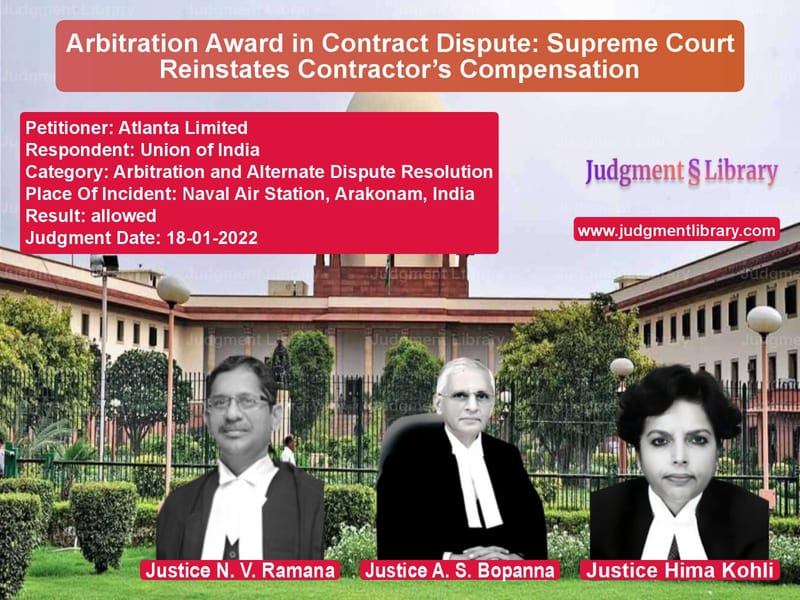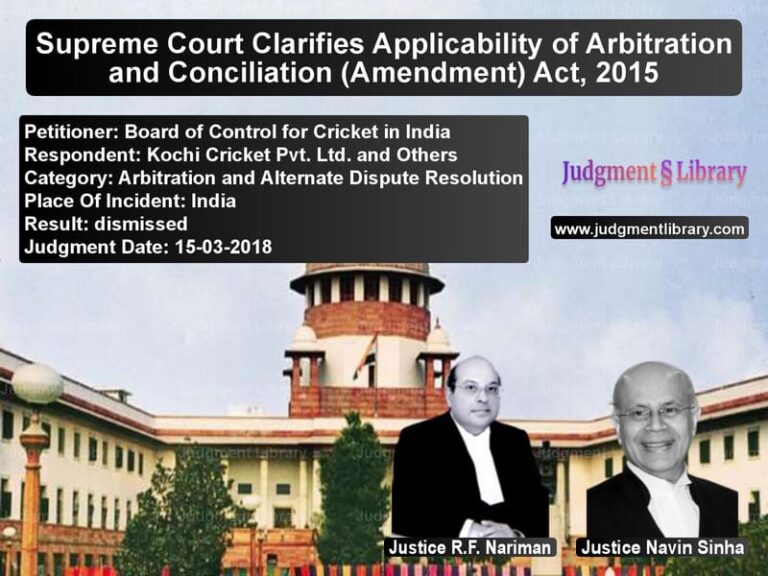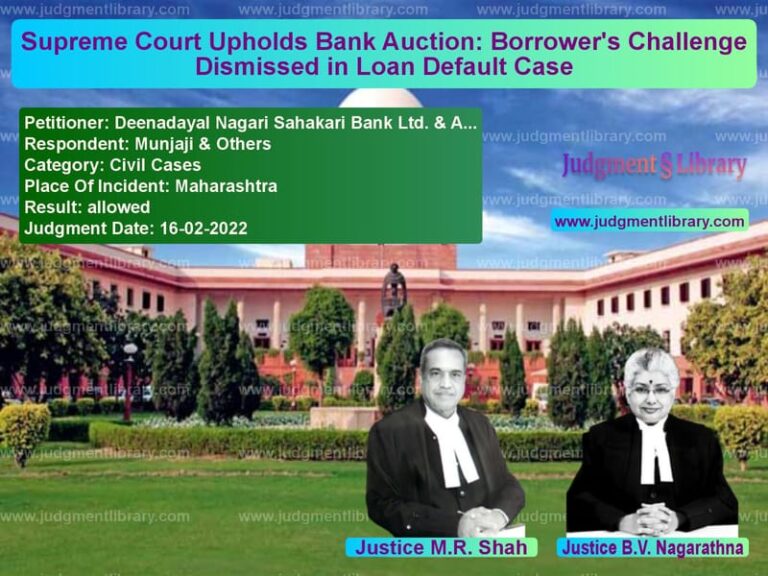Arbitration Award in Contract Dispute: Supreme Court Reinstates Contractor’s Compensation
The case of Atlanta Limited v. Union of India revolved around an arbitration dispute concerning the termination of a construction contract. The dispute was between Atlanta Limited, a construction company, and the Union of India, represented by the Chief Engineer of Military Engineering Services. The Supreme Court’s ruling clarified the principles governing arbitration awards and judicial interference under the Arbitration Act, 1940.
Background of the Case
In 1988, Atlanta Limited entered into a contract with the Union of India for the construction of a runway and allied works at the Naval Air Station in Arakonam. The contract was valued at ₹19.58 crores and was to be completed within 21 months. The site was handed over on November 24, 1988, but due to waterlogging, work commenced only on January 1, 1989.
During execution, Atlanta Limited sought an extension due to various delays. The Union of India granted multiple extensions but ultimately terminated the contract on April 2, 1992, before completion. Atlanta Limited challenged the termination, arguing it was wrongful and caused financial losses due to machinery idling at the site.
Arguments of the Petitioner (Atlanta Limited)
- The termination was illegal as the delays were due to unforeseen circumstances and changes ordered by the Union of India.
- The company had completed 72% of the work when termination was issued.
- The Union of India failed to issue security passes for workers, further delaying completion.
- The claim for idle hire charges and loss of machinery value was justified as the equipment remained unused at the site.
- The arbitration award was based on extensive evidence and should not have been interfered with by the High Court.
Arguments of the Respondent (Union of India)
- The contract was lawfully terminated as Atlanta Limited failed to complete the project within the extended time.
- The issues of time extension and termination were “excepted matters” under the contract, meaning they could not be adjudicated by an arbitrator.
- The claim for idle hire charges was unjustified as Atlanta Limited was given permission to remove its machinery but chose not to.
- The High Court correctly set aside the arbitrator’s decision as it went beyond the terms of the contract.
Key Observations of the Supreme Court
1. Judicial Review of Arbitration Awards
The Supreme Court reiterated that courts have limited scope to interfere in arbitration awards under the Arbitration Act, 1940. The Court stated:
“The arbitrator is the final arbiter of the disputes between the parties. Courts do not sit in appeal over the findings of the arbitrator. The only grounds for setting aside an award are misconduct, legal errors on the face of the award, or decisions beyond the arbitrator’s jurisdiction.”
2. Reasonableness of Time Extension and Termination
The arbitrator had accepted that multiple factors contributed to the delay, including waterlogging, additional work orders, fuel shortages, and restricted site access. The Supreme Court held:
“The arbitrator’s decision that Atlanta Limited was entitled to an extension of time and that the termination was wrongful was based on extensive examination of evidence. The High Court erred in substituting its opinion for that of the arbitrator.”
3. Claim for Idle Hire Charges and Machinery Loss
The arbitrator had awarded compensation for idle hire charges from April 2, 1992, to December 23, 1995, when the remaining work was completed by another contractor. The Supreme Court upheld this finding, stating:
“The machinery remained at the site due to the respondent’s failure to return it promptly. The arbitrator’s award of ₹6.77 crores for idle charges and ₹2.72 crores for machinery value was justified.”
4. The Concept of ‘Excepted Matters’
The Union of India argued that the contract excluded disputes over time extensions and terminations from arbitration. However, the Court ruled:
“The arbitrator correctly interpreted the contract clauses and concluded that these matters could be adjudicated. The High Court erred in setting aside the arbitrator’s findings.”
Final Judgment
The Supreme Court reinstated the arbitration award, ruling in favor of Atlanta Limited. The key takeaways from the judgment are:
- Courts have limited authority to interfere in arbitration awards.
- The arbitrator’s decision on time extensions and contract termination was valid.
- Atlanta Limited was entitled to compensation for idle machinery and equipment loss.
- The High Court exceeded its jurisdiction by reappreciating evidence and substituting its view over the arbitrator’s decision.
This judgment reaffirms the principle that arbitration awards should not be lightly interfered with, ensuring contractual disputes are resolved efficiently and fairly.
Petitioner Name: Atlanta Limited.Respondent Name: Union of India.Judgment By: Justice N. V. Ramana, Justice A. S. Bopanna, Justice Hima Kohli.Place Of Incident: Naval Air Station, Arakonam, India.Judgment Date: 18-01-2022.
Don’t miss out on the full details! Download the complete judgment in PDF format below and gain valuable insights instantly!
Download Judgment: atlanta-limited-vs-union-of-india-supreme-court-of-india-judgment-dated-18-01-2022.pdf
Directly Download Judgment: Directly download this Judgment
See all petitions in Arbitration Awards
See all petitions in Dispute Resolution Mechanisms
See all petitions in Arbitration Act
See all petitions in Enforcement of Awards
See all petitions in Judgment by N.V. Ramana
See all petitions in Judgment by A. S. Bopanna
See all petitions in Judgment by Hima Kohli
See all petitions in allowed
See all petitions in supreme court of India judgments January 2022
See all petitions in 2022 judgments
See all posts in Arbitration and Alternate Dispute Resolution Category
See all allowed petitions in Arbitration and Alternate Dispute Resolution Category
See all Dismissed petitions in Arbitration and Alternate Dispute Resolution Category
See all partially allowed petitions in Arbitration and Alternate Dispute Resolution Category







